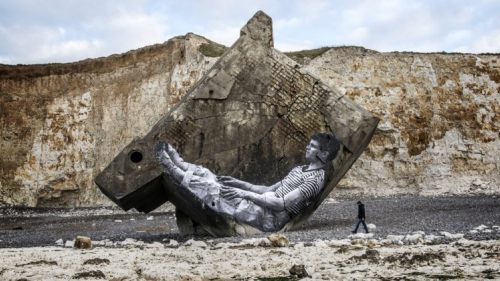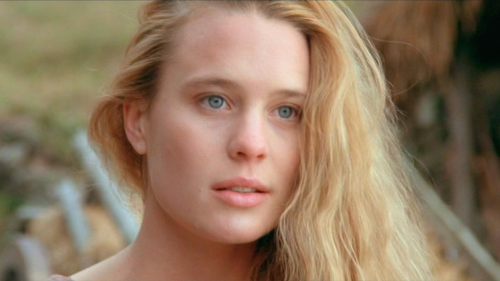Broad Cinema: Ugliness Is A Kind of Death - CLEO FROM 5 TO 7
From Alice Guy-Blaché to Ava Duvernay, women have been integral to cinema for the last 120 years. Broad Cinema is a new column that will feature women who worked on films that are playing this month at the Alamo Drafthouse. From movie stars to directors, from cinematographers to key grips, Broad Cinema will shine a spotlight on women in every level of motion picture production throughout history.
This week we are celebrating Agnès Varda’s Cleo from 5 to 7. Get your tickets here!
If you’re here reading this, odds are good that you’re more or less familiar with the French New Wave. An iconically “cool” cinematic era, La Nouvelle Vague has by now suffered through some 50-plus-years of dissection by film critics, filmmakers, and academics alike. But like the experimental prose of the Beat writers who came a decade before, much of the work of New Wave filmmakers forfeits a piece of its intrinsic rebelliousness when examined with institutionalized rigor. After nearly half a decade of admiration and mimicry, even the most groundbreaking experimental films will seem conventional. They have reshaped convention in their image.
So I suggest watching Agnès Varda’s Cléo from 5:00 to 7:00 with as little knowledge of New Wave filmmaking as you can get away with. I hope that, at this very moment, you are not silently debating my decision to refer to Varda as a New Wave director (actually, she’s cooler-than-cool Left Bank). Such pedantry does not serve a visceral appreciation of Varda’s giddy, messy, meticulously beautiful movie. Of course, her singular camerawork, attention to composition, and editing techniques certainly merit study and analysis (so do interviews with Varda, who’s still a vital and spirited filmmaker). But it’s important to consider Agnès Varda’s decision to harness all of her technical prowess and innovation in the service of telling the deeply emotional, even melodramatic, story of one woman’s afternoon. As the sole female member of the boys’ club that was New Wave cinema in 1962, Varda’s perspective in and of itself was groundbreaking.
To appreciate Cléo from 5:00 to 7:00 in the spirit in which Varda made it, you don’t need a working knowledge of film history. You simply need enough empathy and imagination to appreciate the titular Cléo herself. When Varda overwhelms the eye with lush set design or lingers on a shot a little too long for comfort, it’s as if the director implores you to experience phantom pains of Cléo’s existential dread. If you comply, the film becomes an intense shotgun-ride through the life of a woman exhausted by her own objectification, whose fear of mortality is compounded by the pain of never having lived life on her own terms. For better or worse, Cléo’s growing awareness of the social forces that seek to dictate her own self image feels unexpectedly fresh and relevant, even 56 years later.
Cléo from 5:00 to 7:00 means its title quite literally. Up-and-coming Parisian songstress Cléo Victoire (Corinne Marchand) spends the hours between 5:00 and 7:00 p.m. anxiously contemplating her own mortality as she waits for the results of a medical test that will determine whether or not her stomach cancer is treatable. We meet Cléo at a fortune teller’s, where she stops by to have her spirits lifted with a tarot reading on her way home from the biopsy. Cléo’s cards look as bad as cards can, though the fortune teller cautions her not to interpret the reading so literally. The Death card, after all, can represent either impending mortality or “a complete transformation of your whole being.” This isn’t particularly comforting information to Cléo under the circumstances, and she leaves the room fighting back tears. With this introduction, Cléo from 5:00 to 7:00 follows the minutes of Cléo’s life as her mounting sense of alienation sparks a full-on existential awakening.
At first, Cléo’s defining characteristic is her obsession with her own reflection, which she gazes at nearly constantly. The habit clearly seems to be more coping mechanism than narcissism, as she silently reassures her reflection with platitudes via the voice-over narration. “Ugliness is a kind of death,” Cléo tells herself in the nearest mirror after the ominous tarot reading. “As long as I’m beautiful, I’m still alive.” The logic of this mantra, which Cléo keeps up for the first half of the film, seems melodramatic, superficial, and infantile at first blush. Strip away the distractions of foreign dialogue translation and on-trend period costuming, though, and Cléo’s obsession with fixing her hair in the mirror looks a lot like a bad Instagram habit. She performs her mirror-checking ritual for much the same reasons I might snap a well-posed selfie: If I can make myself look good, make my life look good, then I’m okay. It’s clear that presenting a carefully constructed, beautiful image to the world has been an essential facet of the femme experience for much longer than 52 years. For Cléo, as for many us, if ugliness is a kind of death, then beauty is a right to life.
Cléo lives a charmed life, hailed for her beauty by friends and colleagues, and openly gawked at in the streets as she walks by. This external validation has fueled the singer’s career and ego thus far, but her impending cancer diagnosis sends her reaching for deeper connection. Cléo shares the news of her medical woes with each of the important people in her life: her superstitious personal assistant-cum-maid, two male songwriters, and a dashing older lover. In turn, they each dismiss and condescend to her, assuring Cléo that she must have misunderstood the doctor and encouraging her to stop filling her pretty head with such dark thoughts. When her songwriters visit, they even arrive dressed up like doctors to make light of Cléo’s situation. Galvanized by their blatant disrespect, the ingenue derides her companions for their false concern: “Everyone spoils me, but no one loves me.”
Cléo awakens to the reality that in her life, as it exists now, she is a woman often admired but never seen. To accomplish the enormous task of coming to grips with her own mortality before 7:00 p.m., the songstress’ first stop is her wardrobe, naturally. She rejects the trappings of her isolated, superficial existence by tearing off her elaborate wig and changing from a romantic marabou-lined satin robe to a no-nonsense little black dress. Even in the throes of rejecting her own objectification, Cléo still checks her appearance in the mirror to see how she’s presenting her rebellion. It’s not a foreign idea, or even a paradox, for a woman to play dress-up as an act of self-actualization. Agnès Varda doesn’t reject fashion as a means of constructing one’s self-image, she simply questions what that image should be, and who should determine it.
Most of the real emotional impact of the heroine’s journey in Cléo from 5:00 to 7:00 should be appreciated without setup or analysis. It really doesn’t require much scrutiny to understand where Cléo’s coming from, whether she’s cuddling kittens in an effort to feel better or wearing a fur hat in the summer just to spite her negative friend. But I will put some focus on the few scenes Cléo spends with her friend Dorothée (played with effortless confidence by Dorothée Blanck), a nude artists’ model. The interaction between these two women on-screen would easily qualify as progressive in any modern film. Passing the Bechdel Test without a second thought, the two friends make brief small talk before plunging straight into issues of art, feminism, and self-conception.
Cléo expresses shock and surprise at her friend’s bravery for modeling nude. The singer attributes her reaction to a wholesome sense of modesty, but eventually volunteers that she would feel intimidated because of her own insecurity. Cléo asks Dorothée if she ever feels self-conscious being naked in front of others. Doesn’t she worry that the artists will judge her body for its every little flaw? Dorothée smiles broadly: “My body makes me happy, not proud.” When she’s modeling for the class, Dorothée explains, her body is nothing more than a suggested shape, an idea to inspire their art. The model’s philosophy is validated by Varda when she turns her lens to the sculptures taking shape in the room—a few are voluptuous, others waifish, and some are nearly abstract in form. None of them quite accurately reflects Dorothée’s figure, though they all bear some resemblance to her.
For this model, the fact that no one sculpted a literal interpretation of her form is irrelevant. Dorothée is not interested in their assessment of her body, and her freedom from that need for external validation is a wonderment to Cléo. This conversation hands her one of the keys to her own existential dilemma. Without the need for approval, there is no need to fear rejection. When you feel in control of your life for the first time, even the harrowing minutes before a frightening medical diagnosis can feel full of endless potential. In the hours between 5:00 and 7:00 p.m., Cléo explores what it means to simply be herself, for herself, to make her happy. That’s called radical self-love, and it’s something most of us are still working on 52 years later.



